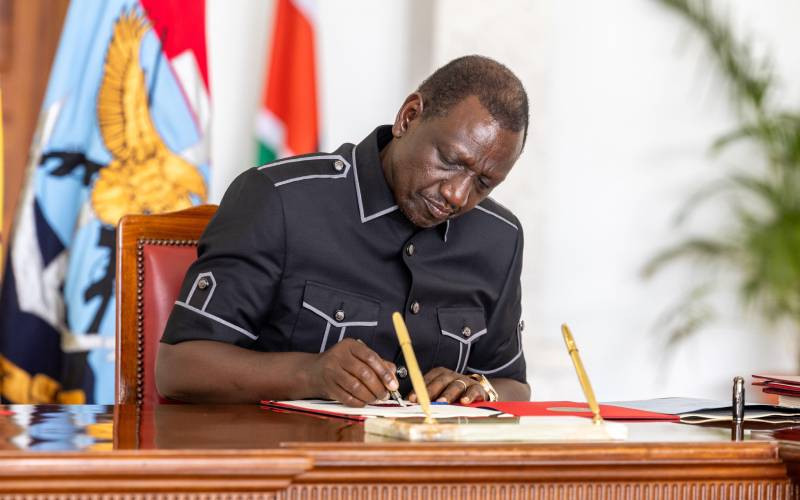By Maureen Akinyi
Pharmaceutical Society of Kenya boss Dr Paul Mwaniki, 37, is tasked with a sensitive job — to ensure Kenyans get quality medicine.
You are a renowned pharmacist. How did it all begin?
I decided to do pharmacy when I was in high school after I was told about the profession by one of my elder brother’s friends who used to visit our home. My twin brother had also decided to do medicine so I opted to go for something in health but slightly different.
What were the considerations when you chose pharmacy as a career?
I had a great interest in chemistry and mathematics and pharmacy presented a good place where I could apply my knowledge in these sciences. I also wanted to have the necessary knowledge to improve the health of my community.
What values and beliefs shape your work?
I should always work hard in order to achieve the best in life. I also believe that teamwork, relationship with people and how you interact with them matters a lot in actualizing what you want to achieve.
Just at 37 years of age, how did you rise to the helm of the Pharmaceutical Society of Kenya (PSK)?
I have been in leadership since I was in university at the School of Pharmacy. When I was in second year I was elected Vice Chairman of Nairobi University Pharmacy Students Association and in my final year I was elected as the Chairman.
At first, I was elected as the treasurer of PSK in 2009 in a by-election when the sitting treasurer went out of the country for further studies.
Due to my good management of the society’s financial affairs, and strategies of increasing the society’s financial base, most pharmacists encouraged me to vie for the chairmanship in 2011. Pharmacists voted for me overwhelmingly and I became the chairman.
I was deeply humbled by the support my fellow colleagues gave me, support they continue to accord me to date. That gives me the motivation to drive the Society to greater heights.
As PSK chairman, what exactly does your job entail?
I manage the Society’s operations to ensure the calendar of activities throughout the year runs smoothly as planned and also to ensure the society’s strategic plan is implemented. I also engage in various stakeholders’ meetings in the health sector and government to ensure that I drive the pharmacy agenda in the health sector, both private and public. I chair the PSK council monthly meetings and also the member’s monthly meetings. I also ensure the various committees of the Society run smoothly.
Stay informed. Subscribe to our newsletter
Since you became chairman of the society, what are your notable achievements?
The society’s membership has increased tremendously and it’s more robust now than ever before. Members turn out in large numbers for society’s activities because the national council, which I chair, comes up with activities which are attractive and of great interest to them.
We have started PISOK Holdings which is the investment arm of PSK. Its aim is to help members to do mega investment ventures.
I am impressed by the uptake of shares in this company and soon we plan to invest in real estate and other investments in the pharmacy sector and any other sector with good returns.
We are almost completing the process of overhauling the current pharmacy law (CAP 244) which the members have always pushed for total overhaul for many years.
PSK has also partnered with Britam insurance to come up with an insurance product that will offer comprehensive medical cover for families.
You have also partnered with a mobile service provider in an interesting initiative that is aimed at saving lives. Tell us more...
The society has also partnered with Safaricom to establish a video link in pharmacy outlets which are owned by PSK members.
The pharmacist and the patient who come to our pharmacies can interact with a medical doctor who is in another location and thus enable the pharmacist and the doctor to manage the patient at the pharmacy outlets. This is the epitome of pharmacists embracing technology to increase efficiency in management of their clients’ health. This product is ideal for those who lack time to travel to the hospitals for common ailments and also those who are in the remote areas where the nearest medical doctors is 200km away. For me, this will tremendously increase access for healthcare for all Kenyans.
Other than at PSK, where else have you worked and what were your roles?
I have worked in Mater Hospital as a pharmacist and my roles involved patient care at the pharmacy and participating in continuous professional development training with my colleagues.
I have also worked at Dawa Ltd — a pharmaceutical manufacturing farm — as a regulatory affairs pharmacist where my role was mainly to ensure that the company meets all the regulators requirements.
But in 2011, I resigned from employment and started my own business.
Since then, I have been the Managing Director of my two flagship businesses — the Kileleshwa Medical Plaza and Kileleshwa Pharmaceuticals Ltd in Nairobi.
During the recent PSK annual meeting in Mombasa, you called for an overhaul of laws governing the pharmaceutical industry. What are the main challenges facing regulation of the practice?
The community pharmacy sector has tremendously been encroached by quacks, which are endangering the lives of Kenyans and are operating illegally. The current laws have law penalties for these quacks making the enforcement to get rid of quacks very difficult.
The number of pharmaceutical inspectors is too low that is less than 90 inspectors for the whole country.
Other than regulation, what in your opinion should be done to enhance value-addition in the pharmaceutical industry?
The cost of power in this country is too high and even unreliable. For this country to achieve Vision 2030, this has to be addressed. It is cheaper to import drugs from India and China than to manufacture here. There is no multinational pharmaceutical company doing any significant manufacturing in Kenya. This has denied the country the benefits of technology transfer and also job creation.
What advice would you give young Kenyans aspiring to be pharmacists?
Pharmacy is one of the most fulfilling careers because you are a major contributor in saving lives. I mean, there is no greater satisfaction than having people coming back and telling you how the medicine you gave them did wonders.
There are also many opportunities in pharmacy like in hospitals, manufacturing, medicine development, research, biotechnology, training, community pharmacy, distribution, marketing, regulation, and management among many others.
How do you give back to the community?
I have organised free medical camps in various parts of the country whereby I source for medicines from various firms who have always heeded my appeal to donate to the needy.
 The Standard Group Plc is a
multi-media organization with investments in media platforms spanning newspaper
print operations, television, radio broadcasting, digital and online services. The
Standard Group is recognized as a leading multi-media house in Kenya with a key
influence in matters of national and international interest.
The Standard Group Plc is a
multi-media organization with investments in media platforms spanning newspaper
print operations, television, radio broadcasting, digital and online services. The
Standard Group is recognized as a leading multi-media house in Kenya with a key
influence in matters of national and international interest.
 The Standard Group Plc is a
multi-media organization with investments in media platforms spanning newspaper
print operations, television, radio broadcasting, digital and online services. The
Standard Group is recognized as a leading multi-media house in Kenya with a key
influence in matters of national and international interest.
The Standard Group Plc is a
multi-media organization with investments in media platforms spanning newspaper
print operations, television, radio broadcasting, digital and online services. The
Standard Group is recognized as a leading multi-media house in Kenya with a key
influence in matters of national and international interest.








